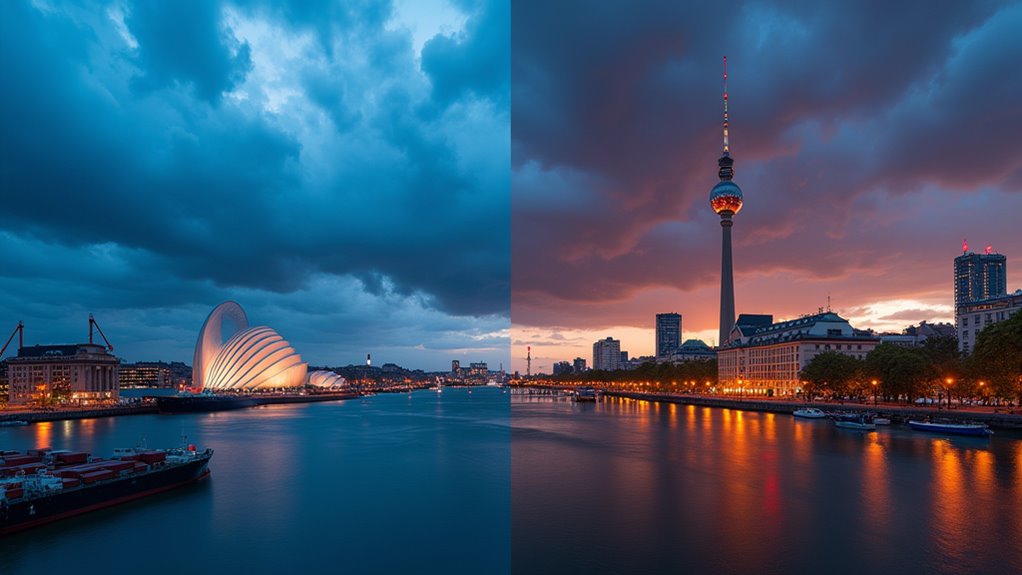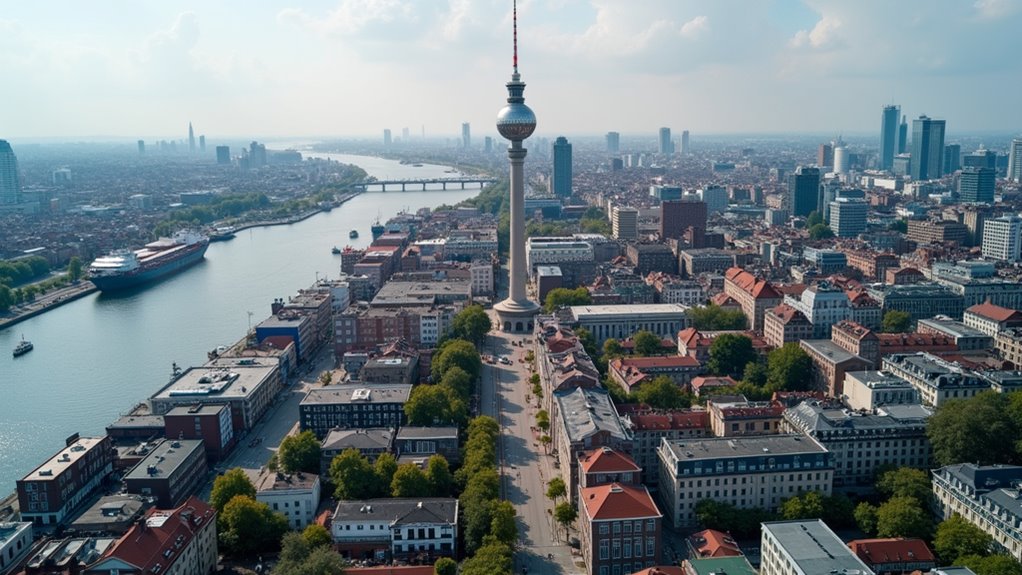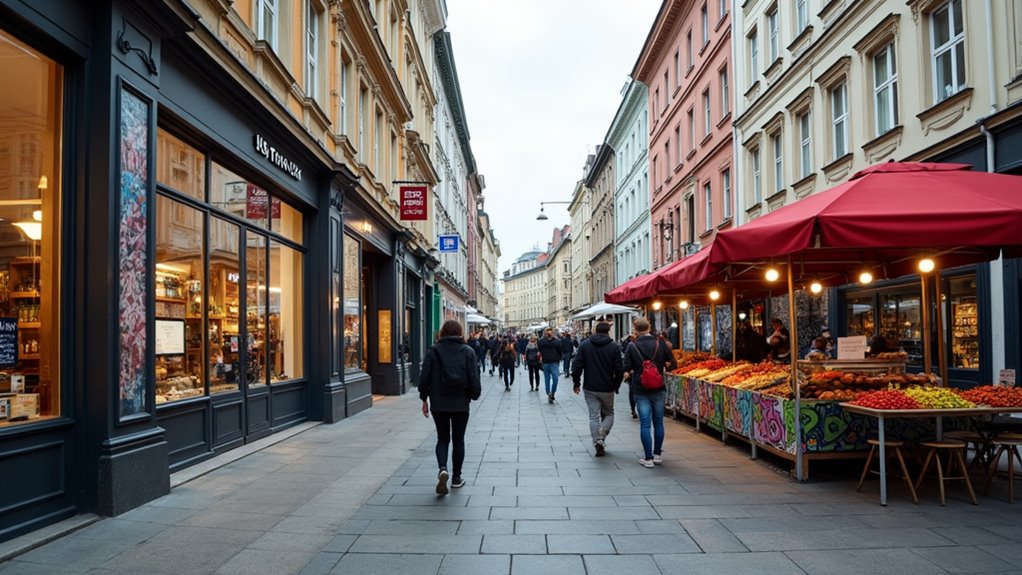Physical Address
304 North Cardinal St.
Dorchester Center, MA 02124
Physical Address
304 North Cardinal St.
Dorchester Center, MA 02124

Deciding between Hamburg's maritime wealth or Berlin's creative energy? Discover which German city truly matches your lifestyle dreams.
When you’re choosing between Hamburg and Berlin, you’re picking between two distinct German lifestyles. Berlin offers a younger, creative vibe with lower living costs but higher unemployment (12.2%). Hamburg boasts better salaries ($230 higher monthly), lower unemployment (8.6%), and higher quality of life scores. Berlin’s tech scene contrasts with Hamburg’s maritime heritage. Your personality type and career goals will ultimately determine which city feels more like home.

When you stack Berlin and Hamburg side by side, the population difference jumps right out at you. Berlin’s 3.58 million folks dwarf Hamburg’s 1.79 million, a gap that’s existed since the 1950s and keeps widening. Berlin added nearly a quarter million people since 2015, while Hamburg barely budged.
You’ll notice Berlin packs in more people too—about 3,900 per square kilometer compared to Hamburg’s 2,300. Berlin draws younger crowds with its universities and startups, while Hamburg attracts experienced workers for its maritime businesses. Despite demographic differences, both cities share a rich culinary heritage that reflects Germany’s connection to Swedish food culture in Northern Europe.
Both cities struggle with low birth rates, but Berlin counters aging through immigration. Looking ahead, Berlin will keep growing faster at 0.09% annually versus Hamburg’s modest 0.06%, with newcomers needing those 20,000 new housing units each year. In Germany’s urban landscape, these two cities are part of only three cities with populations exceeding one million residents.
Although Berlin towers over Hamburg in size, the economic picture tells a different story. Hamburg’s GDP hits $113 billion yearly, outpacing Berlin’s $94.7 billion despite having fewer folks.
Size isn’t everything—Hamburg’s economy punches above its weight against Berlin’s larger footprint.
You’ll find better job prospects in Hamburg too, with unemployment at 8.6% versus Berlin’s steeper 12.2%. Your paycheck stretches further there – Hamburg workers pocket about $230 more monthly than their Berlin counterparts.
Hamburg’s bustling port drives its trade-focused economy, while Berlin blends government jobs with tech startups and creative industries. After hours, Berlin offers a more vibrant nightlife scene compared to Hamburg’s more reserved entertainment options. Hamburg recently experienced a significant market development with transaction volume more than doubling in Q1 2025 compared to previous periods.
Both cities face challenges from high energy costs and those pesky new US tariffs from April 2025.
Looking ahead, construction might pick up, but with 60% of German companies worried about policy uncertainty, neither city’s getting an easy road.

How much your euros stretch depends heavily on which city you call home. Berlin runs about 5% pricier overall than Hamburg, though the gap’s narrowed in 2025. What costs €5,400 monthly in Hamburg would set you back roughly €5,300 in Berlin for a similar lifestyle.
Housing’s the big ticket item—Berlin apartments cost 13% more according to most sources. You’ll pay around €1,000-€1,300 for a decent studio in either city’s center.
Food costs nearly balance out, with Hamburg groceries costing slightly more but restaurant prices practically identical. A dinner date would cost around €80 in Hamburg compared to €70 in Berlin for a mid-range restaurant experience. And if you’re planning a day trip from either city, remember that coastal destinations like Dubrovnik’s spots offer budget-friendly snorkeling opportunities compared to Germany’s higher-priced water activities.
The real wallet-buster? Childcare costs a whopping 64% more in Hamburg.
Transportation runs neck-and-neck, with monthly passes around €80-€100.
Entertainment? Hamburg’s gonna hit your pocket 8-13% harder for those nights out.
Berlin and Hamburg are both racing to redefine their urban landscapes, though they’re taking different paths to get there. Hamburg embraces its green heritage, aiming to protect 30% of its land while investing in sustainable infrastructure. Hamburg’s economy is boosted by shipping and media industries, creating a stable foundation for real estate investments.
Berlin’s buzzing start-up scene is driving property demand, making it a hotbed for investors.
If you’re watching your wallet, Berlin offers better housing bang for your buck at €6,200 per square meter compared to Munich’s steep €9,300.
Hamburg sweetens the deal with lower rent (about $131 less monthly than Berlin) and higher average salaries.
Both cities are pouring money into modernizing infrastructure, but they’ve got different strengths: Berlin’s tech innovation attracts young entrepreneurs, while Hamburg’s maritime roots give it an edge in logistics and transportation. Like Zagreb, Berlin has become a must-visit destination for travelers seeking vibrant cultural experiences in Europe.

When it comes to quality of life, both cities tell different stories depending on what matters most to you. Berlin boasts a “High” healthcare index of 74.89, while Hamburg shines with its “Very High” climate score of 82.75 thanks to milder coastal weather.
Berlin’s healthcare excellence versus Hamburg’s coastal climate comfort — each city offers distinct quality-of-life advantages.
You’ll enjoy a financial edge in Hamburg with higher average salaries ($3,451 vs. Berlin’s $3,221) and lower overall costs (3-5% cheaper than Berlin). Hamburg’s unemployment rate (8.6%) beats Berlin’s (13.6%) handily, suggesting better job stability.
Safety varies by neighborhood in both cities, though Berlin’s higher population density (3,900 people/km² vs. Hamburg’s 2,300) creates a different urban feel. Hamburg’s overall Quality Index of 188.32 exceeds Berlin’s 176.67, confirming its reputation for superior living conditions.
If you’re budget-conscious, Berlin’s slightly cheaper groceries (by 3.3%) might appeal, while Hamburg offers more affordable housing options.
Despite Germany’s stagnant economic outlook, you’ll find stark differences between these cities’ future trajectories. Berlin’s got the upper hand, consistently outpacing national growth rates. While Germany might barely crawl along at 0-0.8% in 2025, Berlin’s likely to keep beating those numbers.
Hamburg faces tougher challenges ahead. Its port-dependent economy is in the crosshairs of looming US tariffs and global trade tensions. Those 25% car tariffs would hit Hamburg’s manufacturers hard. Meanwhile, Berlin’s tech startups and diverse service economy provide a buffer against industrial downturns. The continued weakness in global demand for industrial goods will particularly impact Hamburg’s export-oriented businesses. Unlike these struggling German cities, Danish tourism appeal has been steadily rising as travelers seek sustainable destinations with strong economic stability.
For jobs, Berlin’s adding positions (up 0.3% in 2024) while Hamburg could see unemployment rise if export troubles worsen. Bottom line: Berlin’s decade-long economic outperformance isn’t just luck – it’s built on structural advantages that’ll likely continue.
You’ll find that Hamburg and Berlin aren’t as different as folks make ’em out to be. Just as you’re weighing these cities, I was doing the same last spring. Funny enough, both places offer what you’re seeking—whether it’s Hamburg’s waterfront charm or Berlin’s creative spirit. The best German city? Well, that’s like picking between apple strudel and black forest cake. Depends on your own taste, doesn’t it?